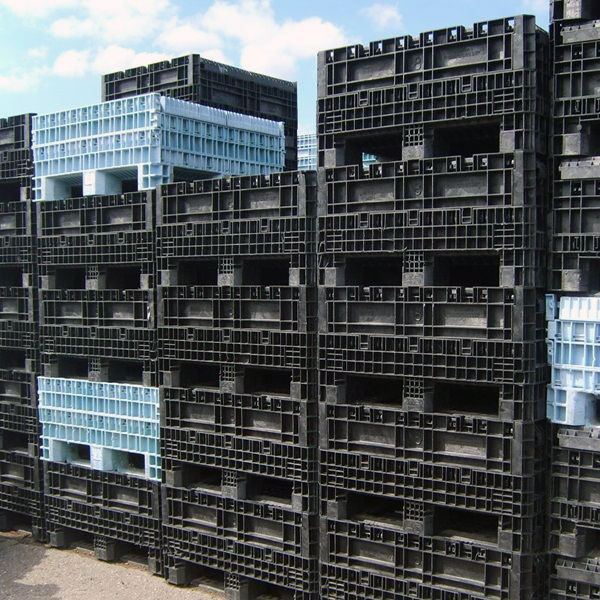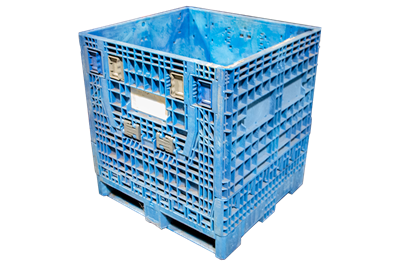The Ultimate Overview to Picking the Right Bulk Containers for Your Organization Demands
Selecting the suitable bulk containers is critical for any kind of company that depends on reliable logistics. Numerous kinds of containers exist, each designed for particular products and applications. Aspects such as size, material compatibility, and governing requirements play a considerable function in this decision-making process. Understanding these elements can bring about boosted functional efficiency. Numerous organizations forget important aspects that might improve their overall performance and sustainability. What are these considerations?
Understanding Different Sorts Of Mass Containers
Mass containers act as vital devices for services seeking efficient storage space and transport remedies. These containers come in various types, each developed to meet certain functional needs. One typical kind is the intermediate bulk container (IBC), which is perfect for granulated and fluid materials, offering a balance of ability and maneuverability. One more prominent choice is the bulk bag, or FIBC, appropriate for dry, flowable products. These versatile containers are light-weight and can be conveniently moved and saved. For much heavier materials, stiff mass containers are usually employed, giving durability and security for secure handling. In addition, there are customized containers tailored for dangerous materials, making sure conformity with safety and security regulations. Understanding the distinctive characteristics of these bulk container types allows businesses to make enlightened choices that optimize logistics and lower prices. By selecting the appropriate container, firms can improve their operational efficiency and improve their supply chain procedures.
Trick Product Considerations for Mass Containers
When selecting mass containers, it is important to consider the products utilized in their construction. Factors such as strength, longevity, and chemical compatibility play a critical function in ensuring the containers fulfill certain functional requirements. Additionally, weight and transportability issues can influence both effectiveness and transport logistics.
Material Toughness and Toughness
Longevity and strength are vital factors in picking materials for bulk containers, as they straight affect the container's capability to stand up to different ecological conditions and managing processes. Products such as high-density polyethylene (HDPE), polypropylene, and stainless steel are generally favored for their durable residential properties, supplying resistance to abrasion, influence, and temperature changes. The option of product also affects the general life expectancy of the container; stronger products commonly result in less regular replacements, leading to cost financial savings with time. In addition, the weight of the product can affect delivery prices and simplicity of handling. Organizations have to consider their particular functional settings and the potential for damage to assure peak sturdiness and toughness in their mass container option.
Chemical Compatibility Variables
Comprehending chemical compatibility is important for choosing bulk containers, as the products made use of must stand up to the specific materials they will certainly hold. Numerous aspects affect compatibility, consisting of the chemical nature of the materials, temperature, and duration of storage space. For example, corrosive chemicals may need containers made from stainless steel or specialized plastics that withstand degradation. Additionally, reactive substances can produce warmth or gases, demanding aired vent or pressure-rated containers. The choice of container product, whether metal, polyethylene, or polycarbonate, need to line up with the chemical residential or commercial properties of the stored substances to stop leakages or breaches. Eventually, a complete examination of these compatibility variables ensures safe handling and storage space, safeguarding both workers and the atmosphere while keeping item stability.
Weight and Portability Concerns
Picking mass containers involves not just assessing chemical compatibility but additionally taking into consideration weight and transportability. Services should evaluate the ease of handling and transport to optimize effectiveness. Light-weight products like high-density polyethylene (HDPE) or aluminum can assist in less complicated movement and lower shipping costs. On the other hand, larger containers may provide enhanced toughness however can hinder movement, especially in atmospheres requiring regular relocation. In addition, the layout of the container ought to enable practical training and piling, making sure ergonomic security for workers. Companies ought to likewise consider the facilities readily available for transport; for example, containers compatible with forklifts or pallet jacks can simplify procedures. Ultimately, the right equilibrium between weight and portability straight influences operational performance and cost efficiency.
Sizing Your Bulk Containers for Ideal Efficiency
When sizing mass containers, organizations have to thoroughly analyze the measurements needed to accommodate their certain items. Furthermore, weight capacity is an important aspect that affects effectiveness and safety and security throughout transport and storage. Effective sizing not just makes best use of area but also maximizes operational process.
Figuring Out Container Dimensions
Choosing the appropriate measurements for mass containers is important for making best use of efficiency in storage and transportation. Services should analyze their specific requirements, taking into account elements such as readily available area, the nature of the products being saved, and the methods of transportation made use of. Exact dimensions ensure that containers fit ideally in cars and storage facilities, minimizing thrown away area and minimizing handling time. Requirement dimensions can use convenience, however personalized dimensions might be essential for distinct requirements or to suit details products. Furthermore, it is necessary to examine stacking capabilities and accessibility, as these aspects influence overall operational efficiency. Eventually, the right measurements lead to improved organization and structured logistics, profiting the general productivity of the business.
Weight Ability Considerations
Understanding weight capacity is important for organizations intending to maximize their mass container efficiency. The weight ability of a container straight affects storage space capacities, transport logistics, and overall operational costs. Picking containers with the ideal weight limitations assures that businesses can safely save and deliver their products without running the risk of damages or conformity problems. Overloading containers can lead to architectural failings, while underutilizing capability cause thrown away sources. When choosing containers, it is important for companies to assess their item weights and think about any kind of regulatory demands. Additionally, aspects such as the kind of material, meant use, and environmental problems should additionally influence weight ability decisions. By reviewing these aspects, services can improve efficiency and ensure a streamlined supply chain.
Regulatory Conformity and Safety And Security Specifications

Regulative compliance and safety and security standards play an essential role in the option of bulk containers for businesses. Organizations should guarantee that their containers fulfill various laws set by regional, nationwide, and worldwide authorities. These criteria frequently relate to product security, structural integrity, and proper labeling, which aid avoid mishaps and guarantee the risk-free transportation of goods.
In addition, adherence to industry-specific guidelines, such as those from the Food and Medicine Administration (FDA) or the Occupational Security and Health Management (OSHA), is essential for business handling harmful products or food items. Non-compliance can result in fines, legal concerns, or damage to a service's track record.
Organizations must also think about the container's compatibility with the materials being stored or moved to stay clear of contamination or chain reaction (used plastic containers). To summarize, understanding and carrying out regulative compliance and security criteria is vital for the reliable and liable use mass containers
Sustainability Choices for Eco-Friendly Bulk Containers

Business are additionally discovering options made from recycled materials, which not just preserve sources yet also support the recycling sector. Advancements in style permit for lighter containers that need less energy to transportation, better improving sustainability. By incorporating these environmentally friendly mass container alternatives, organizations can show their commitment to ecological stewardship while fulfilling customer demand for sustainable techniques. This shift not just aids the earth but can also improve brand online reputation and client commitment.
Cost-Effectiveness and Budgeting for Mass Containers
While numerous organizations concentrate on sustainability, cost-effectiveness continues to be a vital aspect when selecting bulk containers. Organizations must evaluate the first purchase price, as well as long-lasting functional expenses, to ensure economic feasibility. Variables such as reusability, upkeep, and resilience play a considerable role in identifying total expenses.
Purchasing top quality containers may produce higher upfront prices yet can bring about savings via minimized substitute prices and decreased waste. Furthermore, businesses need to take into consideration transport prices and storage space efficiency, as these can impact the general budget plan.

Frequently Asked Questions
Just how Do I Figure Out the Right Container for Hazardous Materials?
To determine the right container for dangerous materials, one should examine compatibility with the compound, consider the container's product, look for regulative compliance, and assess capability and safety and security functions to guarantee appropriate handling and storage space.
Can Mass Containers Be Customized for Particular Products?
Yes, bulk containers can be personalized for specific products. refurbished bulk containers. Various functions, such as size, style, and product, can be tailored to fulfill one-of-a-kind demands, making sure excellent safety and efficiency for moving and storing different products
What Is the Ordinary Life-span of Various Mass Container Kind?
The ordinary life expectancy of bulk container kinds differs; plastic containers last 5-10 years, metal containers 10-20 years, and wooden containers normally last 3-7 years, relying on usage, maintenance, and ecological problems.
Just how Should I Tidy and Maintain Bulk Containers?
To clean up and maintain bulk containers, one ought to frequently check for damages, get rid of deposit, clean with ideal detergents, rinse extensively, and warranty proper drying prior to storage. Following producer standards improves durability and safety and security during use.
Exist Rental Choices for Bulk Containers Available?
Yes, various companies use rental alternatives for mass containers, giving versatility for services. These rentals can fit numerous demands, permitting companies to take care of supply successfully without the commitment of acquiring containers outright.
Sturdiness and toughness are essential elements in choosing products for mass containers, as they straight influence the container's capability to withstand different environmental conditions and taking care of procedures. Comprehending chemical compatibility is vital for picking mass containers, as the products used have to withstand the specific materials they will hold. Recognizing weight capacity is vital for companies aiming to optimize their bulk container efficiency. Regulative conformity and safety and security criteria play an important function in the choice of mass containers for services. While many businesses concentrate on sustainability, cost-effectiveness remains a critical factor when picking mass containers.